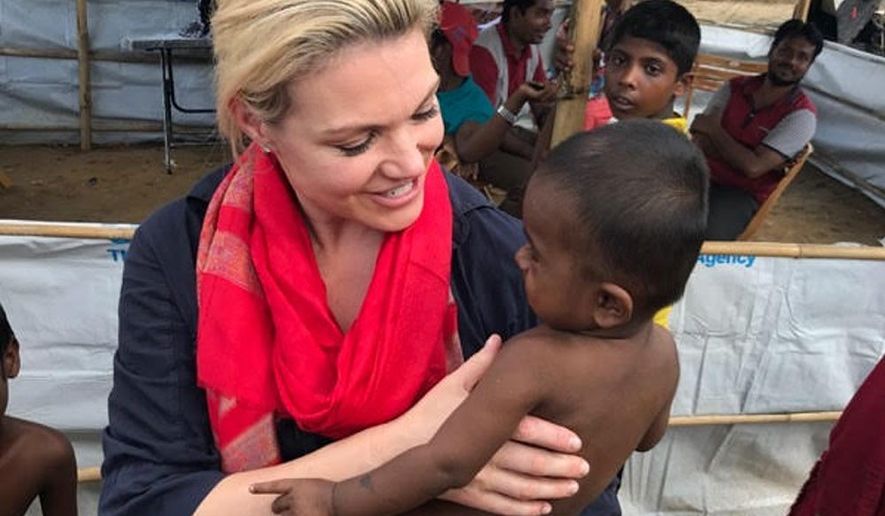OPINION:
Myanmar’s security forces have systematically attacked the country’s Muslim minority, known as the Rohingya, for many years.
The United States and the international community have denounced this violence, which includes mass killings and widespread rape of civilians, but the world has done little to hold Myanmar to account. This must change or the lives and safety of the Rohingya people will never improve.
The United Nations concluded last year that that Myanmar’s government failed to prevent what it determined was genocide. International legal bodies and non-governmental organizations have further documented the “destruction of villages and homes, denial of access to food, shelter and other essentials of life.” As a result of this persecution, Myanmar, which is also known as Burma, has forced the Rohingya people to flee to neighboring Bangladesh. In just three years, more than a million Rohingya have fled their villages and inhabit the world’s most populous refugee camp, Cox’s Bazaar, unable to return home.
In November 2017, I traveled to Bangladesh with my State Department colleagues to survey the conditions in which the Rohingya lived. I saw multi-generational families who had made the long, cross-border journey on foot arrive at a medical center staffed by Doctors Without Borders. Some were too weak to walk. Infants and the elderly were quickly triaged and given medical care. Children traveling alone were issued temporary identification cards containing what little information could be gathered, such as a village name, in hopes that they could be reunited with their families.
Tragically, three years later, not much has changed for the refugees. Cox’s Bazaar has continued to swell in size and, today, makeshift schools and shops have been established. This appearance of permanence — while a tangible proof of generosity by Bangladesh and the U.S. among other countries — has raised international doubts whether the Rohingya will ever safely return home to neighboring Myanmar.
Persecution of the Rohingya by Myanmar’s security forces has caused four separate exoduses of Rohingya to Bangladesh since 1978. Myanmar, which is a majority Buddhist country, has empaneled a series of commissions that concealed the truth. In 2012, it created the Commission of Inquiry on Sectarian Violence in the Rakhine State, the region where the Rohingya live. Rather than investigating what happened and punishing the perpetrators, it called for an increased military and police presence, empowering the very people responsible for the attacks. The commission, in effect, blamed the victims.
Four years ago, the so-called Rakhine State Investigation Commission did not name anyone who committed the violence. A related investigation dismissed allegations of rape and religious persecution, directly contradicting findings by the United Nations. This year, Myanmar’s Independent Commission of Enquiry, which examined attacks on Rohingyas dating back to 2017, rejected accusations of killings and rapes without ever interviewing a single Rohingya refugee in Bangladesh. Like all of Myanmar’s commissions, this too was a cover for impunity.
Two young Reuters journalists were not convinced by Myanmar’s denials. In 2018, they reported that 10 Rohingya men were massacred in the village of Inn Din. As a result, seven of the soldiers who took part in the killings were sentenced to 10 years in prison. Shockingly, Myanmar also sentenced the reporters to prison and the U.S. worked tirelessly to secure their release. The pair received the Pulitzer Prize for their work. The jailed soldiers were released within six months, though the reporters suffered a longer time in prison.
International organizations have voiced serious concerns about Myanmar’s actions. The United Nations’ Independent International Fact-Finding Mission urged the U.N. Security Council and world governments to impose economic sanctions against companies run by Myanmar’s armed forces as a penalty for their crimes. Yet, trade with and foreign direct investment in Myanmar has continued to grow.
Leading Western countries from the U.S. to Germany have declined to use their commercial power to sanction Myanmar for its heinous actions or convince the country to behave more responsibly. The U.S. and U.K. barred top Myanmar generals from entering their countries, but they withdrew economic sanctions, allowing their two-way trade to increase manifold.
The European Union once threatened to withdraw the trade preferences that ensure that Myanmar-produced goods have duty-free access to the EU common market. But that, too, never happened.
Myanmar has whitewashed its crimes against the Rohingya for too many years. International organizations have talked about penalizing the country for those actions. But none have gone far enough.
It is time for the world’s leaders to increase pressure on Myanmar to protect its Rohingya minority and to allow them to return to their homes in Rakhine State and live there safely.
• Heather Nauert is the State Department’s former acting under secretary for public diplomacy and public affairs.




Please read our comment policy before commenting.